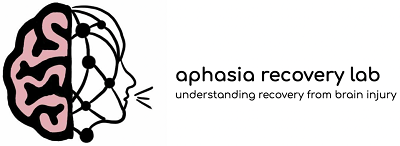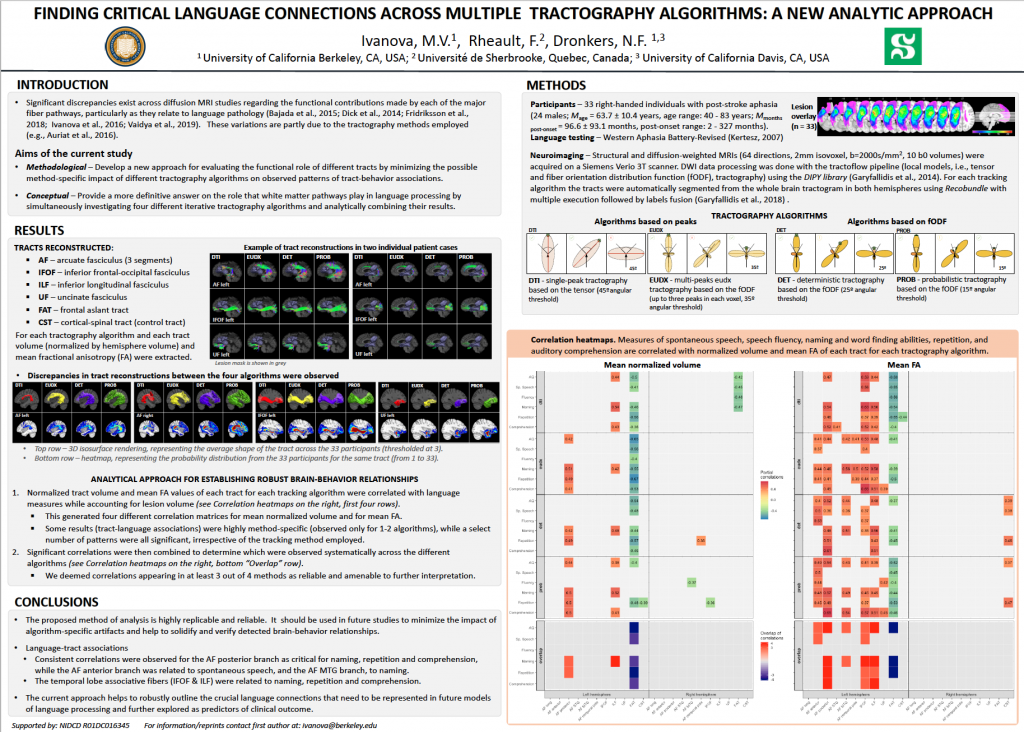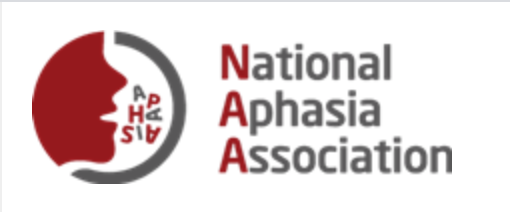Nina Dronkers receives a Distinguished Career Award from the Society for the Neurobiology of Language. Click here for more information: https://www.neurolang.org/2023/distinguished-career-award-recipient/
October, 2023
PEX pilot results presented at NeuroNetwork Career Symposium. APEX preprint: https://www.medrxiv.org/content/10.1101/2024.01.09.23299774v1
November, 2023
Nicoletta presents poster at Neuroscience 2023 annual meeting of the Society for Neuroscience (SfN), Washington D.C., USA.
November, 2023
Nicoletta: First study assessing syntactic acquisition in a large cohort of 996 children, between 4 and 12 years of age. The study shows that different sentence types are differently acquired based on their syntactic complexity.
November, 2023
Vanessa Anderson does honors thesis and poster presentation at UC Berkeley Molecular & Cell Biology Honors Symposium.
May, 2023
Talk and poster presentation at the 61st Annual Meeting of the Academy of Aphasia, Reading, UK, and two poster presentations at at Academy of Aphasia, and two poster presentations at the 15th Annual Meeting of the Society for the Neurobiology of Language (SNL), Marseille, France
October, 2023
Poster presentation at the 30th anniversary meeting of the Cognitive Neuroscience Society (CNS), San Francisco, USA.
March, 2023
Aphasia Recovery Lab celebrates the holidays with an end-of-the-year brunch!
December 8, 2022
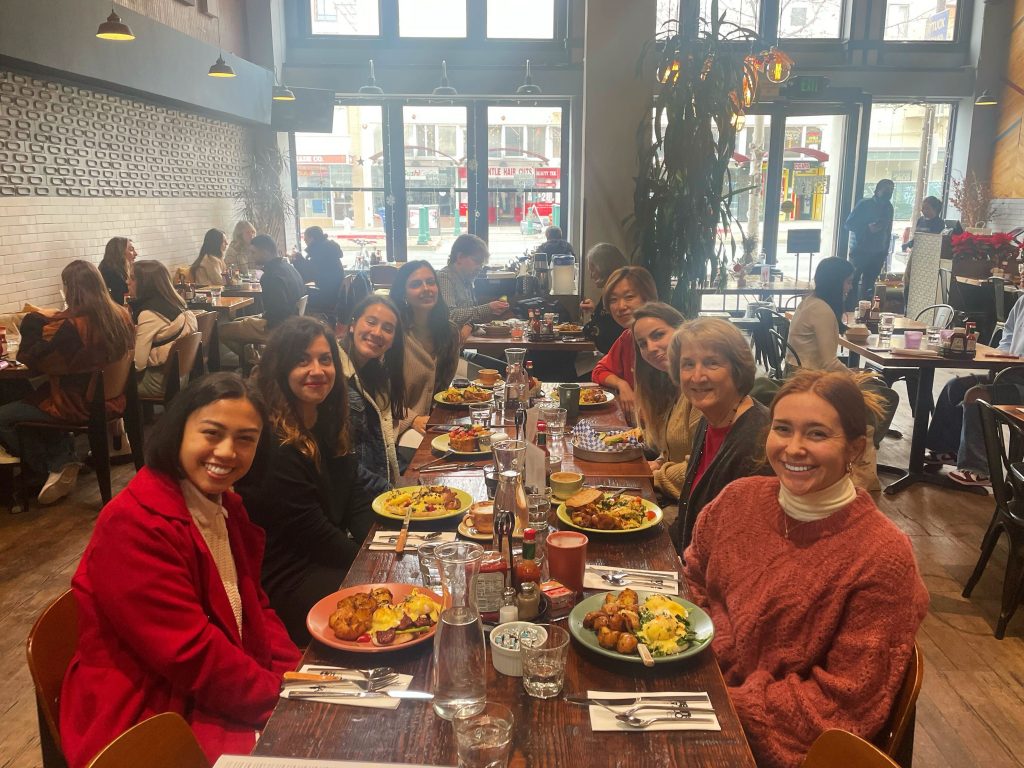
Aphasia Recovery Lab celebrated a successful year of research, mentorship, and friendship. We wish all of you a wonderful holiday season and urge everyone to stay safe and enjoy themselves!
Alexis and Maria both presented at the 60th Annual Academy of Aphasia Conference in Philadelphia, Pennsylvania!
October 23-25, 2022
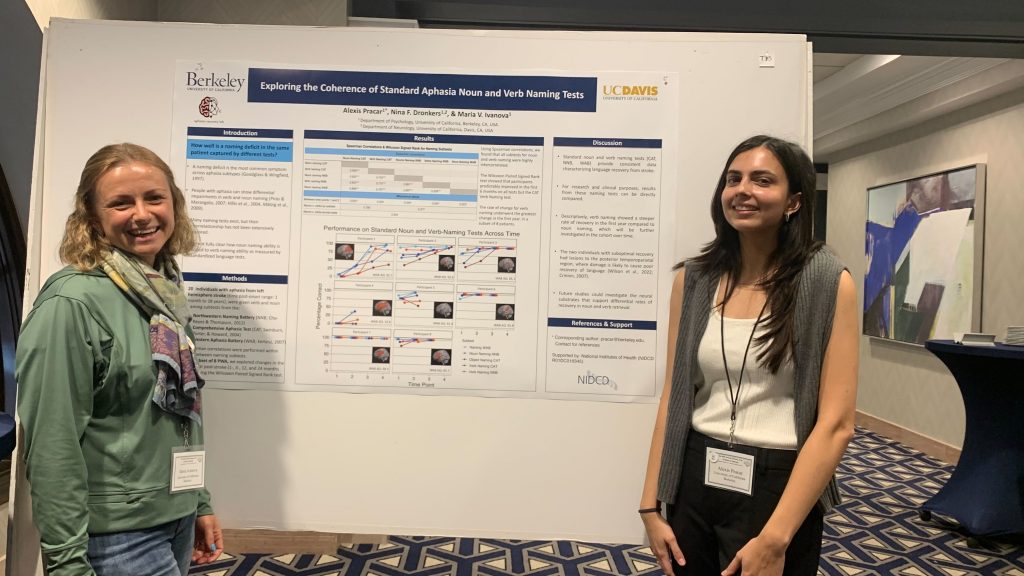
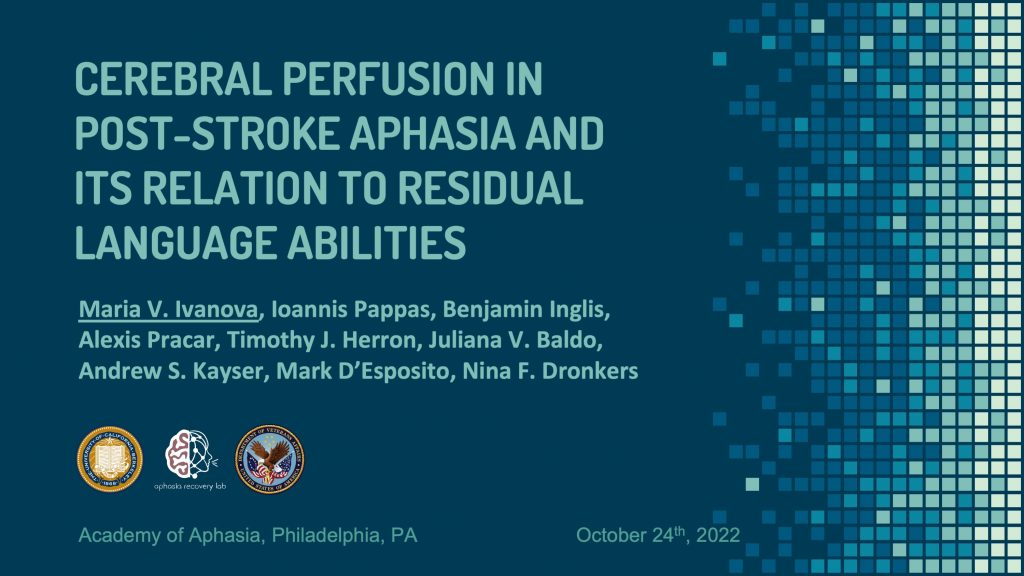
Alexis and Maria both presented individually at the 60th Annual Academy of Aphasia Conference in Philadelphia! Alexis presented her poster titled “Exploring the Coherence of Standard Aphasia Noun and Verb Naming Tests” which can be accessed HERE.
Maria gave a presentation focusing on her work understanding cerebral perfusion in post-stroke aphasia! Her talk was titled “Cerebral Perfusion in Post-Stroke Aphasia and Its Relation to Residual Language Abilities”.
Nicoletta presents at the 14th Annual Meeting of the Society for the Neurobiology of Language in Philadelphia!
October 6-8, 2022
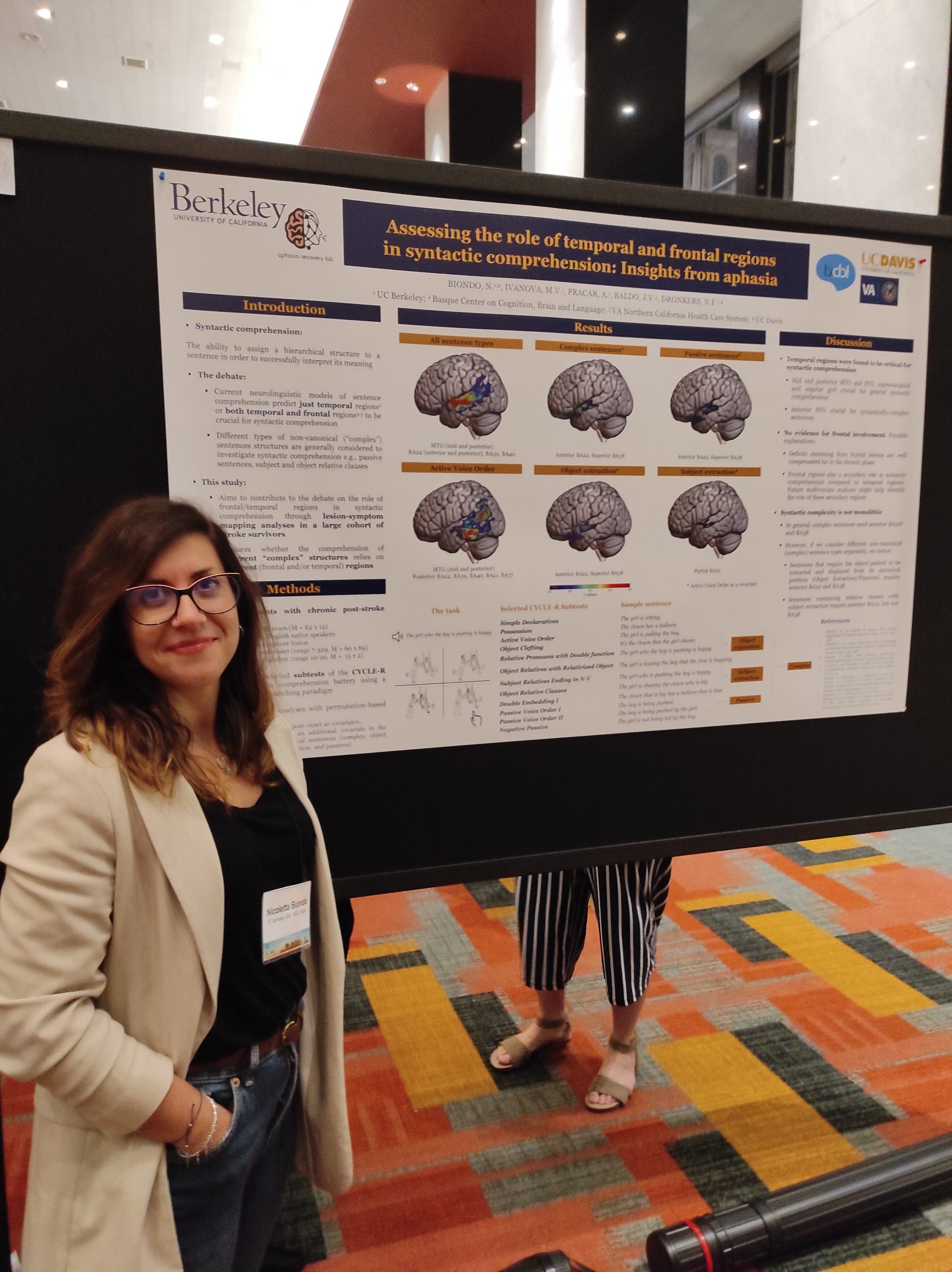
Nicoletta presented the posters “Assessing the role of temporal and frontal regions in syntactic comprehension: Insights from aphasia” and “A systematic investigation of linguistic and non-linguistic processing of time in people with aphasia” at the 14th Annual Meeting of the Society for the Neurobiology of Language (SNL) held in Philadelphia this year. For more details about these projects click HERE!
Alexis Pracar is one step closer to becoming a doctor!!
September 22, 2022
Alexis, our cherished graduate student, has just passed her qualifying exams and has advanced to candidacy for her doctorate degree! Many congratulations, Alexis!!!
New publications from our lab
April 26, 2022
Our paper on the Frontal Aslant Tract is published in NeuroImage: Clinical. In this study we explore the role of this new intralobar tract in speech and language functions in patients with post-stroke aphasia. The results demonstrate its specific and unique role in motor speech.
You can access this publication here!
Teaching the Next Generation of Researchers
April 4, 2022
A paper on aphasia written by Maria Ivanova and Nina Dronkers is published in Frontiers for Young Minds, a unique scientific journal with papers written by scientists specifically for kids, that are reviewed by a board of kids and teens. Our paper talks about how brain damage leads to a language disorder called aphasia. We discuss different types of aphasia, various language difficulties that people with this disorder encounter, and provide information about how language is processed in the brain.
And here is a link to a recording of a live review of this paper:
Dr. Dronkers discusses actor Bruce Willis’ aphasia diagnosis
March 31, 2022
Dr. Nina Dronkers appears on ABC News to discuss actor Bruce Willis’ aphasia diagnosis and to bring light to the study and understanding of language and the brain.
You can watch the interview here!
New Faces!
March 18, 2022
Nicoletta Biondo joins the lab as a postdoc. Nicoletta is a psycholinguist who has been awarded a Marie Skłodowska-Curie global fellowship to pursue research on aphasia at the University of Berkeley and at the Basque Center on Cognition, Brain, and Language (BCBL) in Spain. She will be part of the team for the next 2 years.
On screen appearances
January 14, 2022
In a feature titled “When Words Fail, Music Speaks” on KQED Dr. Dronkers and Alexis Pracar discuss the idea that music and singing can benefit the recovery of language in aphasic individuals.
Watch the interview here!
Happy birthday to our dearest mentor, advisor, and friend, Dr. Nina Dronkers!
January 7, 2022
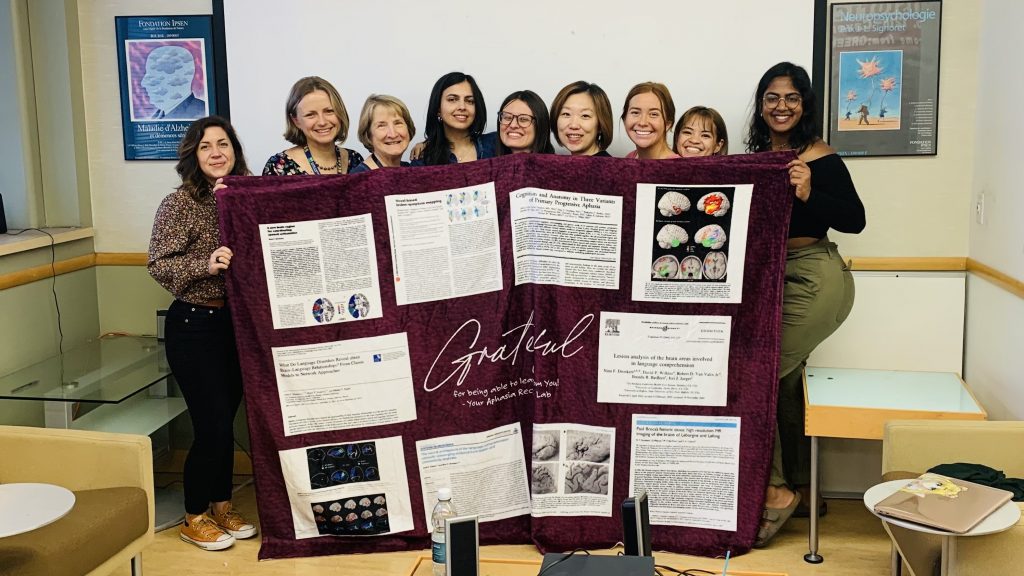
New publications from our lab
November 21, 2021
The Russian Aphasia Test: The first comprehensive, quantitative, standardized, and computerized aphasia language battery in Russian.
Maria Ivanova and colleagues publish their important work on the creation of a Russian Aphasia Test on par with its English counterparts.
Abstract: The lack of standardized language assessment tools in Russian impedes clinical work, evidence-based practice, and research in Russian-speaking clinical populations. To address this gap in the assessment of neurogenic language disorders, we developed and standardized a new comprehensive assessment instrument – the Russian Aphasia Test (RAT). The principal novelty of the RAT is that each subtest corresponds to a specific level of linguistic processing (phonological, lexical-semantic, syntactic, and discourse) in different domains: auditory comprehension, repetition, and oral production. In designing the test, we took into consideration various (psycho)linguistic factors known to influence language performance, as well as specific properties of Russian
The Aphasia Recovery Lab resumes in-person lab activities!
September 13th, 2021
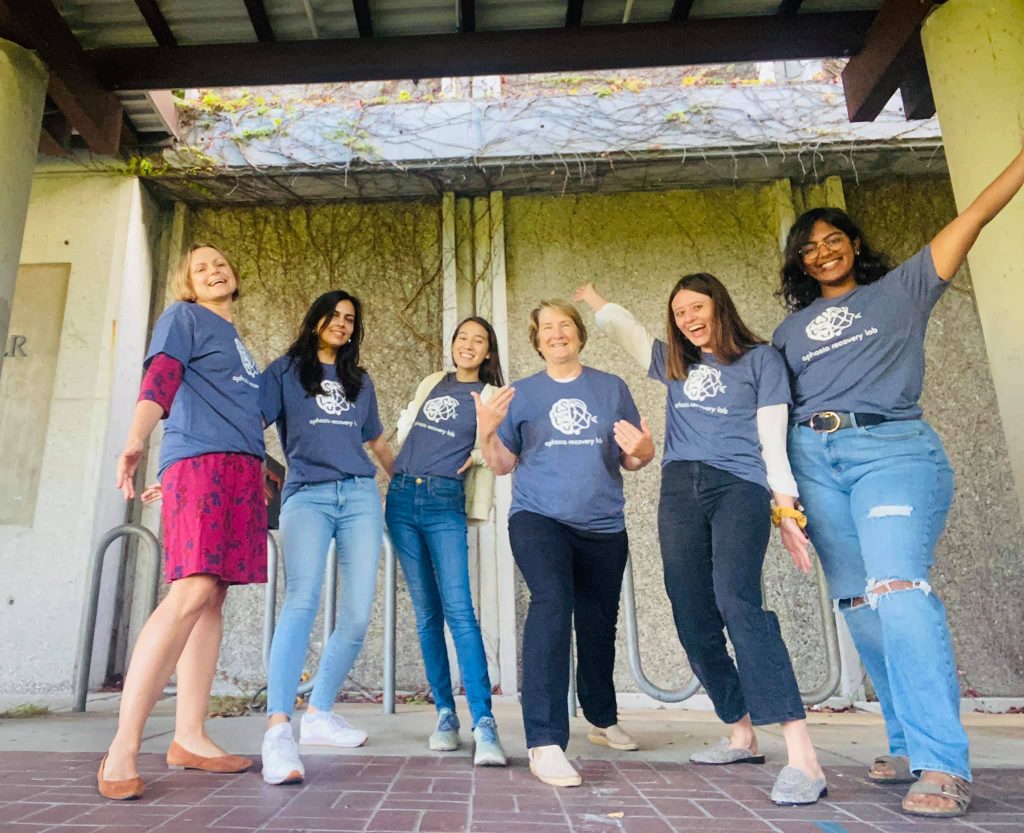
New papers from our lab:
August 12, 2021
We are excited to share two recent publications with our amazing colleagues from the Center for Language, Imaging, Mind & Brain at the VA Northern California Health Care System, Martinez, CA.
In the first paper published in NeurImage: Clinical we examined a rare case of tactile agnosia, in which a small white matter lesion in the left hemisphere adjacent to the corpus callosum, a large white matter tract connecting the two hemispheres, selectively impaired the person’s ability to name letters and numbers presented to the ipsilesional, left hand. This case highlights the significant impact that a focal white matter lesion can have on higher-level cognition, specifically the integration of verbal and tactile information.
Read the paper by clicking this link
The second paper published in Frontiers in Neurology explored the time course for recovery of auditory comprehension abilities following stroke. The study demonstrated that the posterior left middle temporal gyrus plays a crucial role in recovery of both word and sentence level comprehension. Overall, the observed patterns underscore that spontaneous recovery of auditory comprehension can continue well beyond the first year post-stroke.
Read the paper by clicking this link
New paper: “Gender bias in academia: A lifetime problem that needs solutions”
July 7, 2021
Drs. Nina F. Dronkers and Maria V. Ivanova contributed to a paper “Gender bias in academia: A lifetime problem that needs solutions” that was just published in Neuron. In this article an international team of scientists lead by Dr. Anais Llorens, University of California, Berkeley, CA and Dr. Athina Tzovara, University of Bern, Bern, Switzerland reviewed empirical evidence demonstrating pervasive gender bias throughout all stages and venues of academic life. The paper provides a comprehensive overview of the current issues and proposes concrete solutions that can adopted at the individual, institutional and societal levels to address these problems, bringing about a shift in culture and gender equity across career stages and scientific disciplines.
Read the paper by clicking this link
New paper from our lab: “Functional contributions of the arcuate fasciculus to language processing”
June 25, 2021
A new paper from our lab entitled “Functional contributions of the arcuate fasciculus to language processing” has been published in Frontiers for Human Neuroscience. In this study using novel tractography techniques we uncovered a broad role that the arcuate fasciculus, a large white matter bundle that connects the frontal and temporal lobes, plays in language processing, especially in comprehension and naming. The posterior segment of this tract, that directly connects inferior parietal and temporal regions, was found to be particularly crucial for supporting residual language abilities. A deeper understanding of the functionality of structural connections in the brain will help us develop more accurate models of how language is processed in the brain.
Read the paper by clicking this link
Dr. Nina Dronkers speaks at the UC Berkeley Retirement Center
March 15, 2021
Learning in Retirement – Imaging the Fibers of the Brain: What They Tell Us About Brain Function
Dr. Maria Ivanova speaks at UC Berkeley Cognitive Neuroscience Colloquium
January 25, 2021
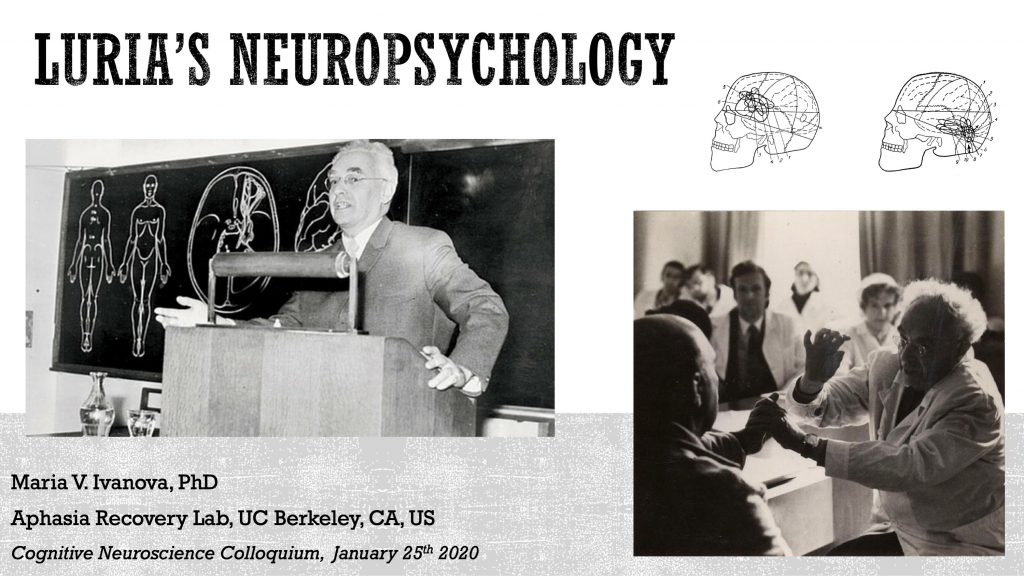
The talk focused on one of the most comprehensive theories about cognition and its neural mechanisms, which was proposed by a Russian physician and psychologist, Alexander Romanovich Luria. The talk presented the main tenants of Luria’s theory of systemic dynamic localization of higher cortical functions, which was based on his analysis of over 800 patient cases during World War II. The main principles of neuropsychological analysis within this framework were outlined.
Happy New Year!
January 1, 2021
New paper: An empirical comparison of univariate versus multivariate methods for the analysis of brain-behavior mapping
Maria V. Ivanova 1,2 | Timothy J. Herron 2 | Nina F. Dronkers 1,2,3 | Juliana V. Baldo 2
1 University of California, Berkeley, California, 2 VA Northern California Health Care System, Martinez, California, 3 University of California, Davis, California
Click here to download the paper
Our paper on methodological aspects of lesion-symptom mapping has just been published in Human Brain Mapping. Lesion symptom mapping tools are widely used in neuroscience on brain injury data to identify the neural structures critical for a given behavior. In this published study, we provide a much-needed systematic comparison of several univariate and multivariate methods, using both synthetic and real data to identify the potential strengths and weaknesses of both approaches.
The current results showed no clear superiority of either univariate or multivariate methods overall, as accuracy of methods varied differentially depending on specific conditions. Thus, different lesion symptom mapping methods are indicated, depending on the particular study design, specific hypotheses, and sample size.
Overall, we recommend the use of both univariate and multivariate methods in tandem to enhance confidence in the results: Brain foci identified as significant across both types of methods are unlikely to be spurious and can be confidently reported as robust results.
The Aphasia Recovery Lab presents at fall conferences:
The Academy of Aphasia (October 18-20)
The Society for the Neurobiology of Language (October 21-24)
At the Academy of Aphasia, PhD student, Alexis Pracar, presented a poster entitled: “A case of pure apraxia of speech after left hemisphere stroke: behavioral findings and neural correlates”
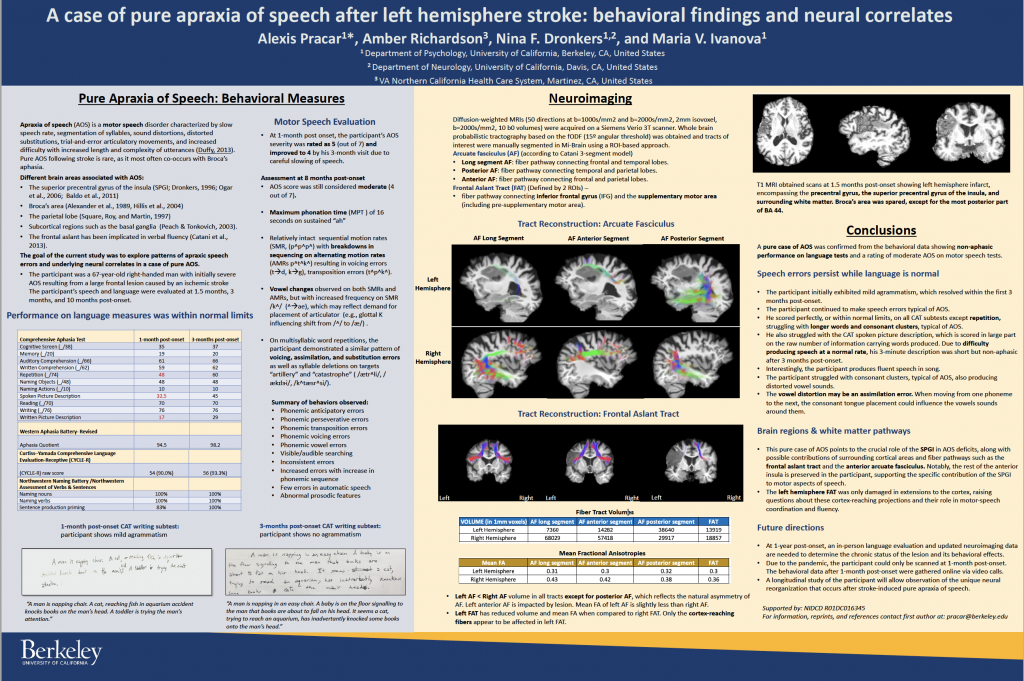
At the Society for the Neurobiology of Language, Dr. Maria Ivanova presented a poster entitled: “Perfusion levels in the left hemisphere are associated with language outcomes in chronic post-stroke aphasia”
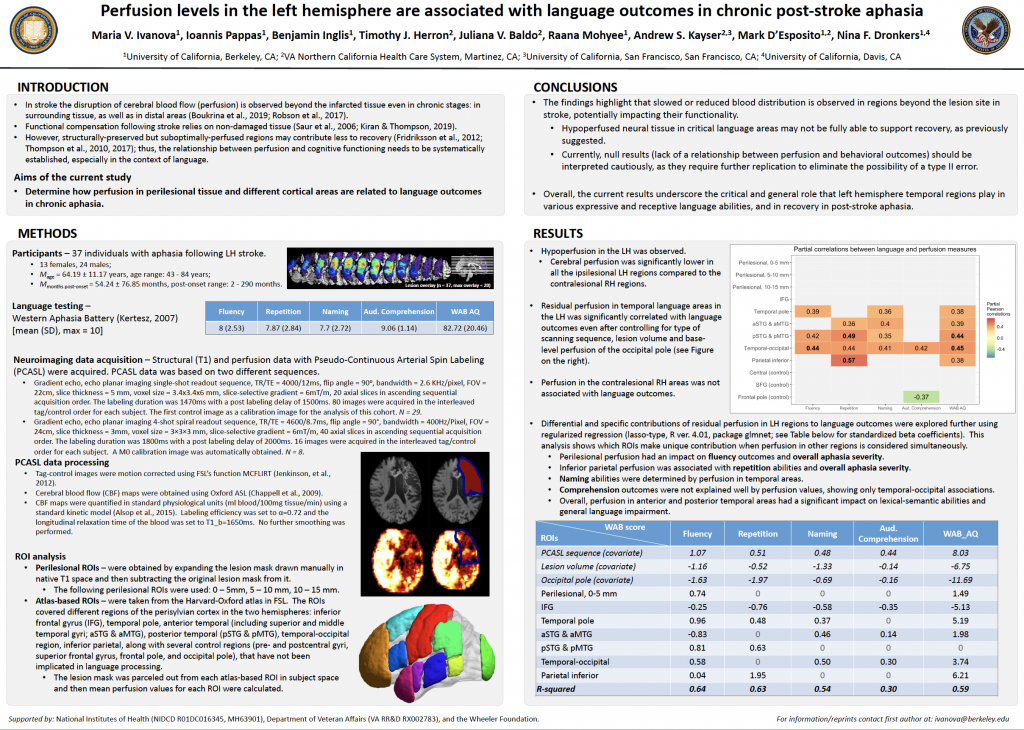
World Stroke Day
October 29, 2020
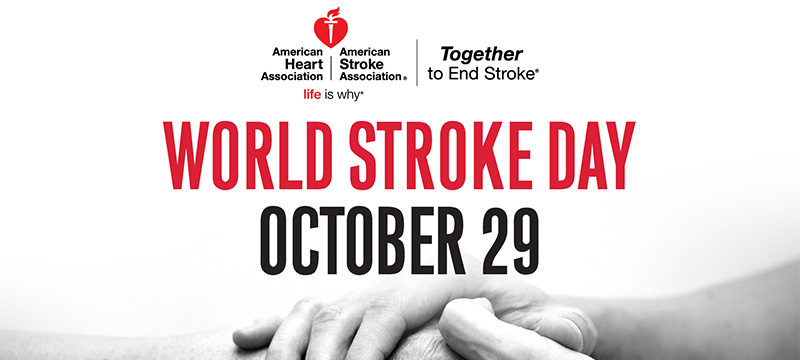
Today is World Stroke Day.
We want to remind everyone that although COVID-19 has changed the world, the hospitals are still the safest place for you to be when medical emergencies strike. Don’t hesitate or doubt: Call 911 at the first sign of a heart attack or stroke.
Please click the link below:
“5 reasons why hospitals are safe for heart stroke emergencies — even in the pandemic”
New American Stroke Association Guide for Patients and Caregivers: Life After Stroke
October 2, 2020
Learn about the science behind strokes, diagnosis, and treatment options, the changes that happen post-stroke, helpful tips, preventing another stroke, and so much more!
Please click here to download the guide
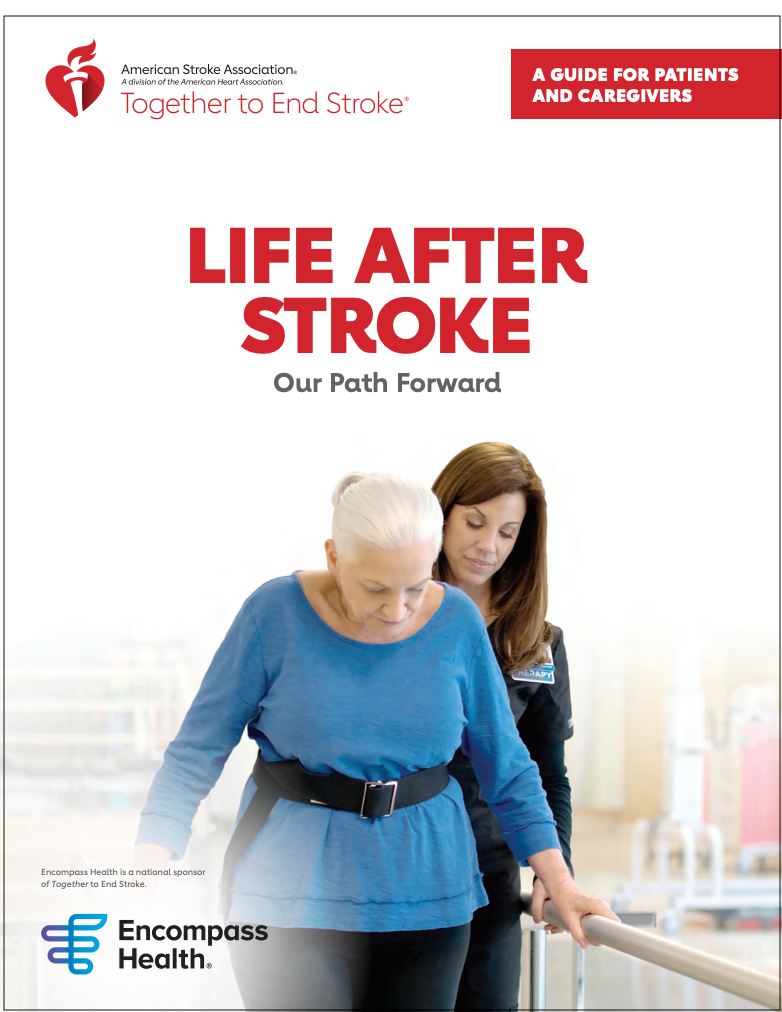
“If you are the caregiver, family member or friend of a stroke survivor, your role is vital. You should know the prevention plan and help your loved one to comply with the plan. With a committed health care team and a rehabilitation plan specific to their needs, most stroke survivors can prevent another stroke and thrive.”
Life After Stroke, American Stroke Association, 2020
Aphasia Games!
September 8, 2020
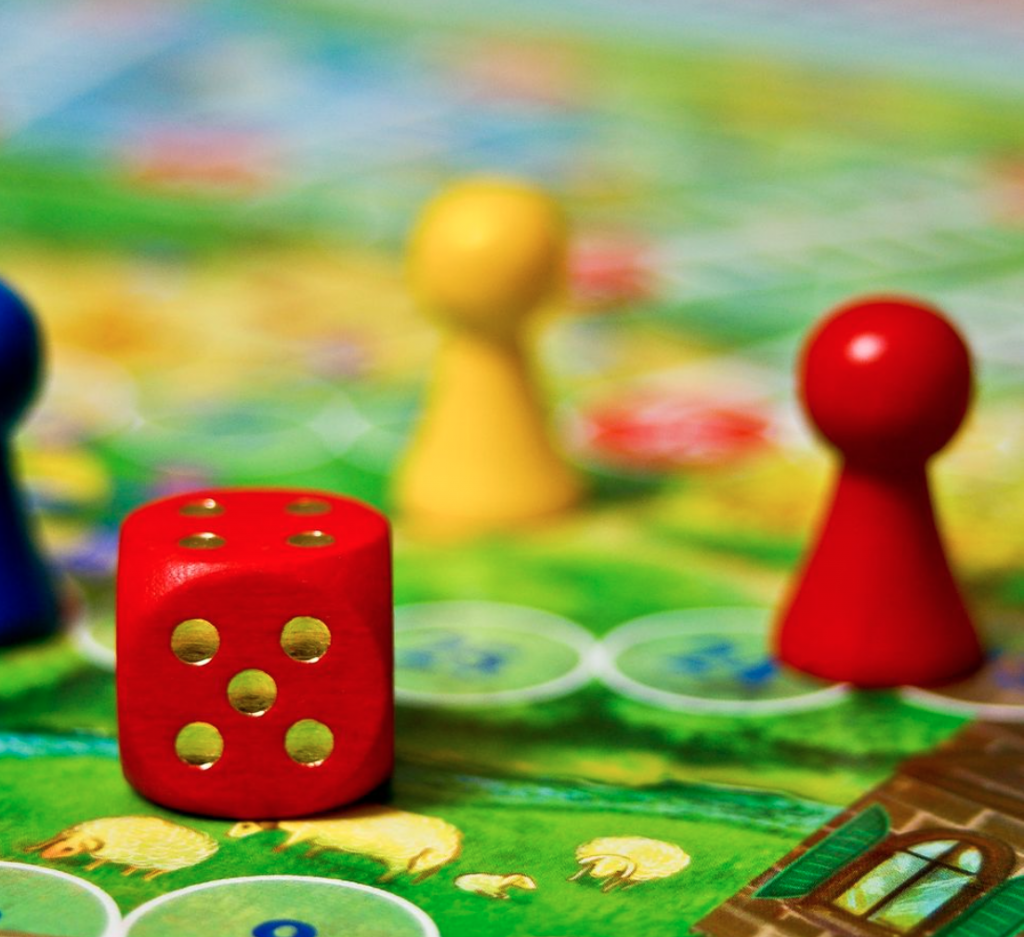
Now is a great time to play games. Playing games can boost cognitive function and language skills.
You can play crosswords, board games, word games on your phone, talking games, and so many more.
Check out this aphasia-friendly list games from the National Aphasia Association: Click here
New Research on Clinical Skills for Aphasia Aids!
September 1, 2020
Here is some current research that investigates the proper way to educate clinicians on how to communicate and assess people with aphasia. This article titled “Preparing student clinicians to reveal communication competence in people with aphasia: Are there more effective and efficient modalities for training clinical skills?” may be of interest to patients with aphasia who are interested in bettering the quality and effectiveness of the care they receive! Click here to view the article
Start of the academic year with the Aphasia Recovery Lab
August 25, 2020
The school year isn’t starting as we hoped it would, however, we are excited to get back into the swing of things!
To read about updates, please download our newsletter: click here
Living with aphasia during Covid-19
June 30, 2020
Living in the age of the coronavirus is challenging for anyone, but how does having aphasia factor into this difficulty? Here is a video from a fellow person with aphasia who has taken the time to speak about his personal struggles with having a communication barrier in the time of COVID-19. Please click on the image below to view the video.
2020 Virtual Annual Meeting of the Organization for Human Brain Mapping
June 24, 2020
The pandemic might be keeping us at home, but it is not precluding us from engaging in scientific exchange with our colleagues across the globe. Dr. Maria Ivanova and Dr. Nina Dronkers presented the lab’s tractography work at the 2020 Virtual Annual Meeting of the Organization for Human Brain Mapping. Together with their colleague Francois Rheault from the University of Sherbrooke, they demonstrated a new analytical approach for combining results from multiple tracking algorithms to determine critical brain-behavior connections.
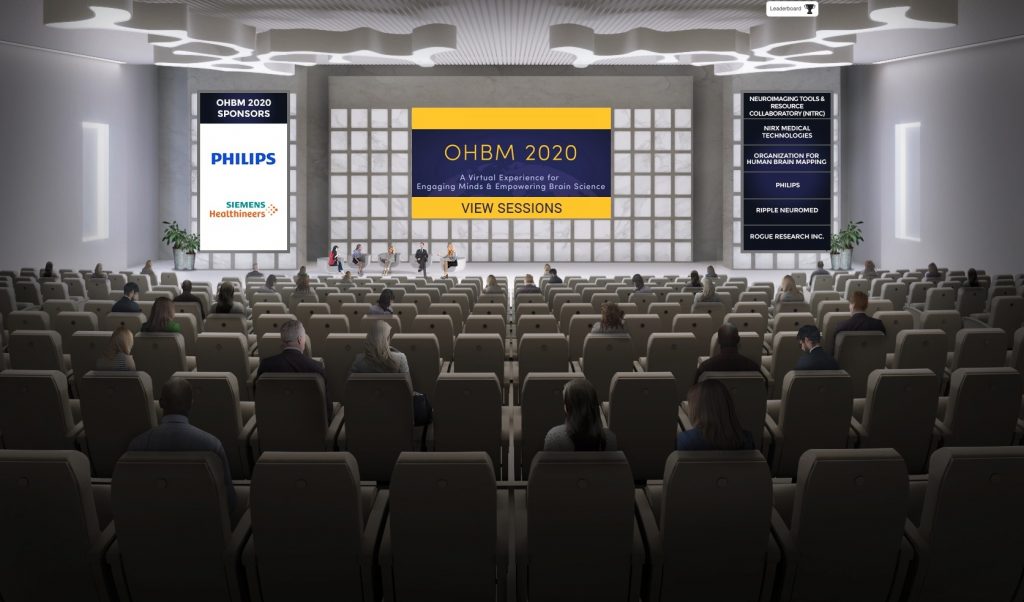
COVID-19 safety tips: aphasia card and regular doctor visits
June 20, 2020
In these uncertain times, going to see the doctor can seem really scary. Especially with COVID-19 virus still affecting so many. The attached article by the National Aphasia Association has great information for those with aphasia when it comes to seeing the doctor and staying well in general. Most importantly, carrying your aphasia card (link to card found in the article). Remember to stay safe, wear a mask, wash your hands frequently, and to keep your mental health in mind.
Aphasia Blogs
June 14, 2020
As quarantine is extended, it is important to find communities and groups that can be of assistance and support during these times of social isolation. The National Aphasia Association has a list of online communities as well as support blogs that could prove to be incredibly useful while on the journey to recovery. They can be found here:
Online Aphasia Communities – National Aphasia Association
Additionally, you can check out our list of blogs:
https://aphasia.studentorg.berkeley.edu/resources-for-patients/
June is National Aphasia Awareness month!
June 1, 2020
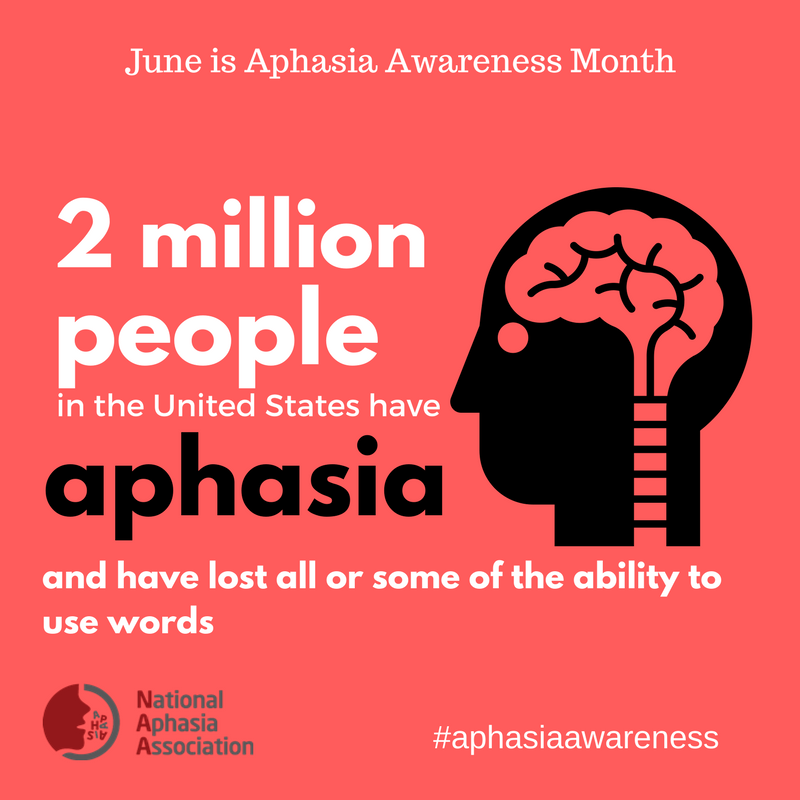
2 million people in the United States have aphasia, but more than 80% of Americans state that they’ve never heard the term aphasia. It is time to spread the word about aphasia to pave the way for better communication experiences for people living with aphasia.
The National Aphasia Association has made available a list of infographics and materials about spreading the word on aphasia. When you visit their website be sure to take an aphasia personality quiz and learn about daily activities you can do from home. Also, subscribe to their YouTube channel that offers great video resources on aphasia including 1-minute Aphasia Tips.
The American Stroke Association also has great materials and resources on aphasia, like Tips from Those Living with Aphasia and Communication Advice from Experts.
Dr. Maria Ivanova to give C-STAR Lecture on May 21, 2020
May 15, 2020
The C-STAR lecture series offers biweekly lectures on aphasia, rehabilitation after stroke, neuroimaging and neurostimulation methodology, and the neurobiology of language.
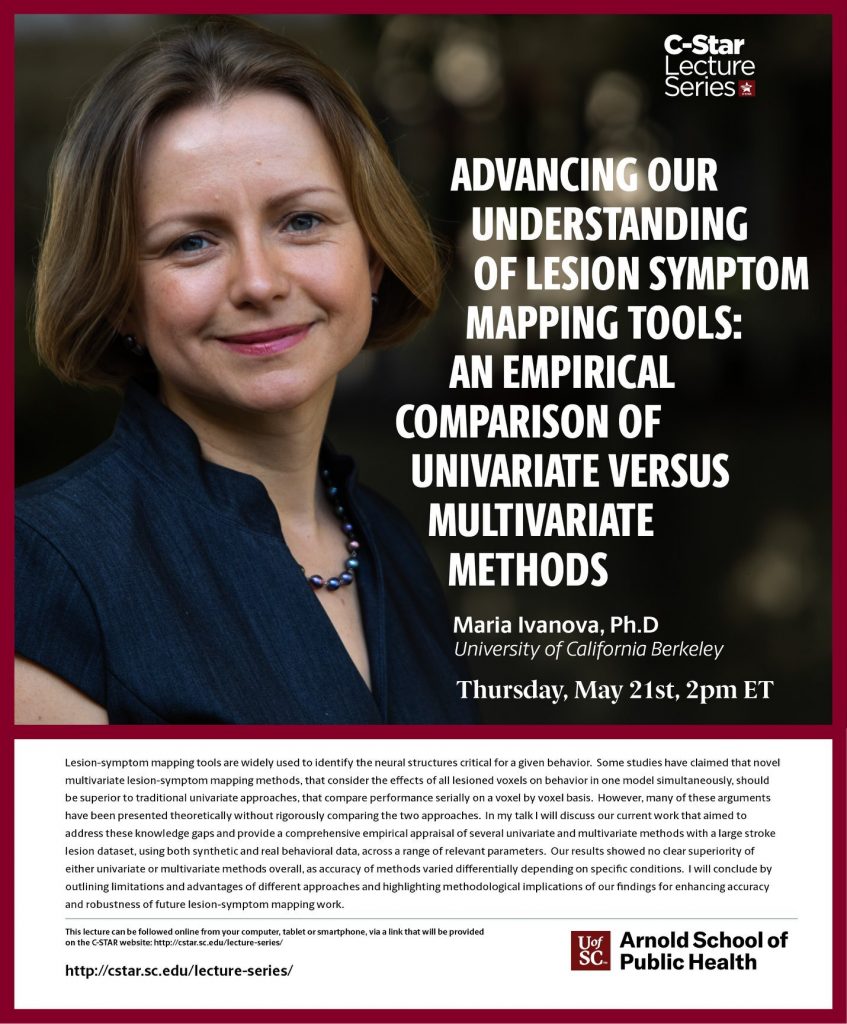
Abstract: Advancing our understanding of lesion symptom mapping tools: An empirical comparison of univariate versus multivariate methods
Lesion-symptom mapping tools are widely used to identify the neural structures critical for a given behavior. Some studies have claimed that novel multivariate lesion-symptom mapping methods, that consider the effects of all lesioned voxels on behavior in one model simultaneously, should be superior to traditional univariate approaches, that compare performance serially on a voxel by voxel basis. However, many of these arguments have been presented theoretically without rigorously comparing the two approaches. In my talk I will discuss our current work that aimed to address these knowledge gaps and provide a comprehensive empirical appraisal of several univariate and multivariate methods with a large stroke lesion dataset, using both synthetic and real behavioral data, across a range of relevant parameters. Our results showed no clear superiority of either univariate or multivariate methods overall, as accuracy of methods varied differentially depending on specific conditions. I will conclude by outlining limitations and advantages of different approaches and highlighting methodological implications of our findings for enhancing accuracy and robustness of future lesion-symptom mapping work.
Aphasia Recovery Lab Newsletter
May 10, 2020
The Aphasia Recovery Lab has just sent out its first official newsletter to members of our community. Catch up with members of the lab, read safety tips, and find fun ways to spend your time.
Click here to open the newsletter
Taking on Teletherapy: Experiences and Recommendations from a PCSAS Training Clinic Adapting to COVID-19, with contributions from Dr. Nina Dronkers
April 30, 2020
Read an excerpt below:
“With over 2 million confirmed cases worldwide and most of the U.S. population currently under a “stay at home” order, the COVID-19 pandemic has caused major disruptions in health care services, including mental health care. Psychological distress is widespread partly due to increased social isolation and decreased access to care. Mental health providers must act quickly to adapt policies and delivery mechanisms to continue treatment remotely. Teletherapy — the delivery of psychotherapy via live audio/video communication software — enables clinical psychologists to deliver critical care, while maintaining public health and safety.”
Click to read the full article
Dr. Nina Dronkers appointed UC Berkeley Adjunct Professor
February 2, 2020

Dr. Nina Dronkers has been appointed Adjunct Professor of Cognitive Neuroscience in the Psychology Department. She will continue to lead the Aphasia Recovery Lab and to mentor her students.
New Aphasia Caregiver Guide!
January 2020
The National Aphasia Association released a comprehensive Aphasia Caregiver Guide. It covers all types of aphasia in all situations–whether at home or in the hospital.
Click here to visit their site
57th Academy of Aphasia Meeting held in Macau!
October 27-29, 2019
The Aphasia Recovery Lab jet set to Macao for the 2019 Academy of Aphasia.
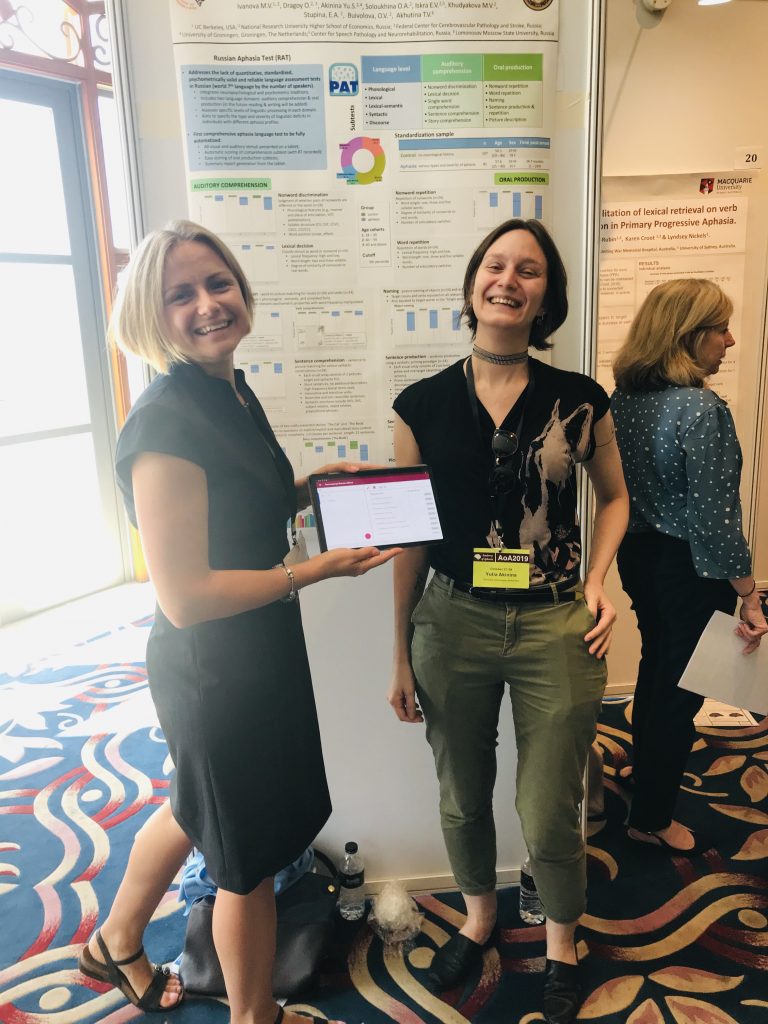
Dr. Ivanova demonstrates the tablet-based R.A.T. 
Beautiful architecture of Macao! 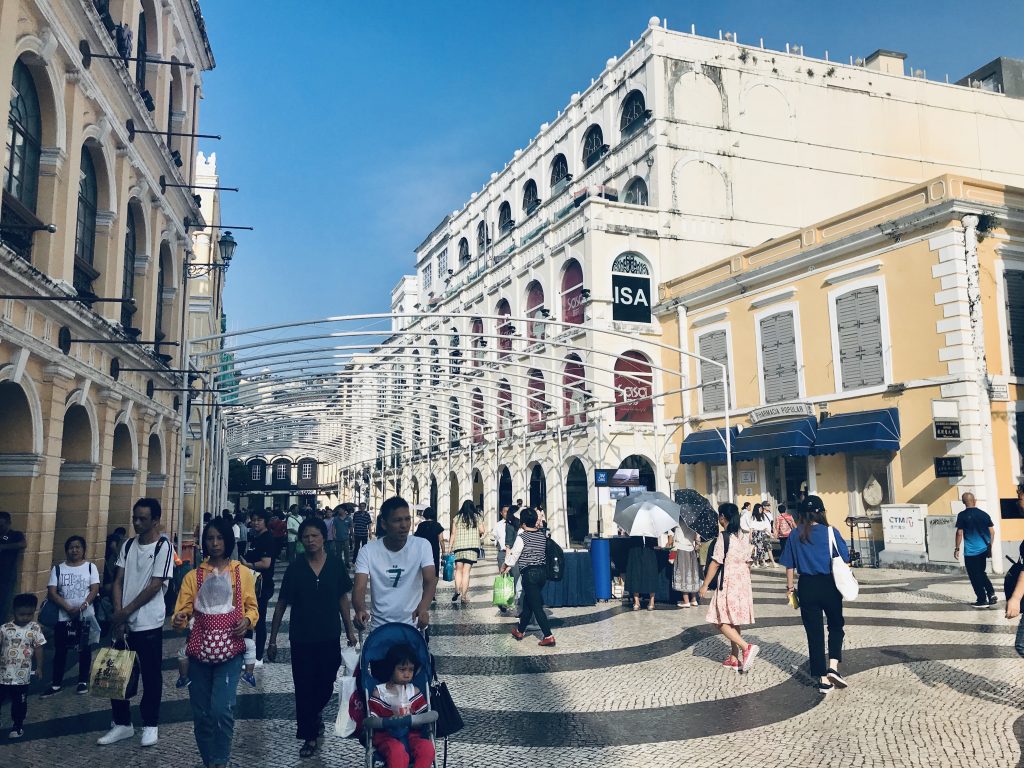
Bustling city life!
Dr. Ivanova presented exciting research on Standardizing the Russian Aphasia Test: Normative Data of Healthy Controls and Patients with Aphasia. Although Russian is the world’s 7th most spoken language, there is a lack of standardized and reliable language tests for Russian speakers. Dr. Ivanova presented a comprehensive solution to this problem that integrates neuropsychological as well as psychometric work. Additionally, and equally as exciting, Dr. Ivanova and colleagues propel the field into the 21st century by creating the first fully digitized comprehensive aphasia test to be administered by tablets and other smart devices.
Dr. Nina Dronkers gave a presentation on the neural correlates of ASTVM by measuring the repetition of high- and low-frequency sentences in two groups of aphasic patients with different etiologies (vascular and neurodegenerative) using similar voxel-based anatomical analyses.
The Eleventh annual meeting of the Society for the Neurobiology of Language
August 20-22, 2019
Dr. Nina Dronkers and Dr. Maria Ivanova, and research assistant Alexis Pracar traveled to the eleventh annual meeting of the Society for the Neurobiology of Language in Helsinki, Finland. Dr. Ivanova presented her research on “Navigating the turbulent seas of lesion-symptom mapping: Comparative analyses of univariate and multivariate lesion-symptom mapping methods.”

(Left to right) Dr. Nina Dronkers and Dr. Maria Ivanova present their research during a poster session in Finlandia Hall! 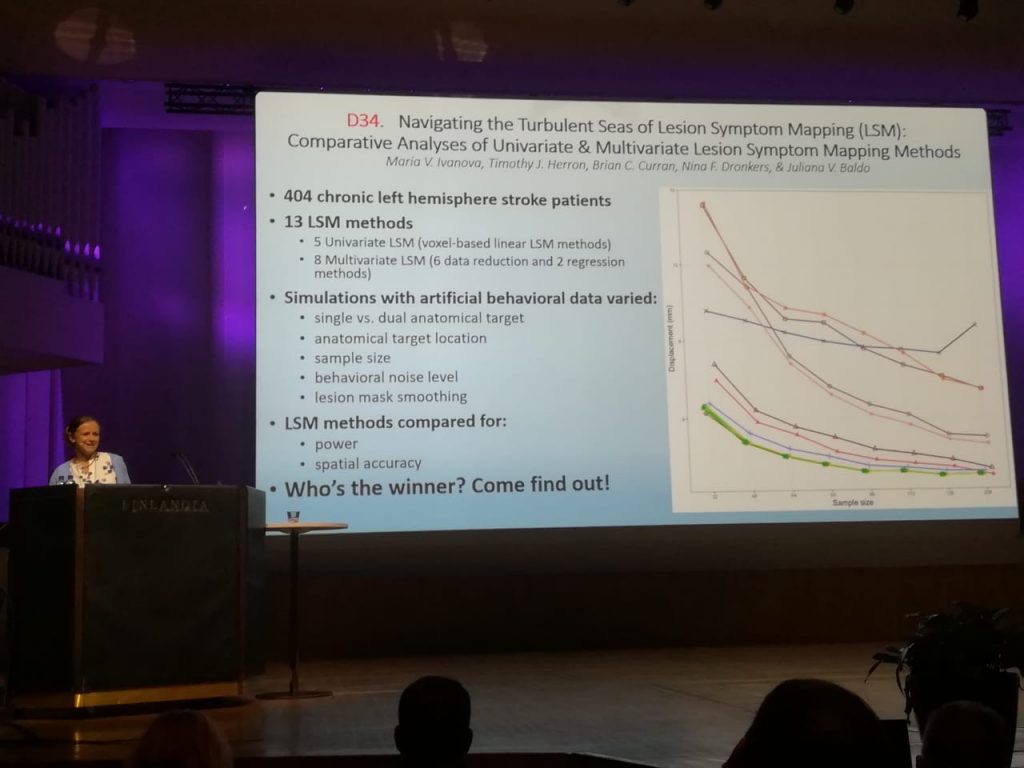
Dr. Ivanova at poster slam! 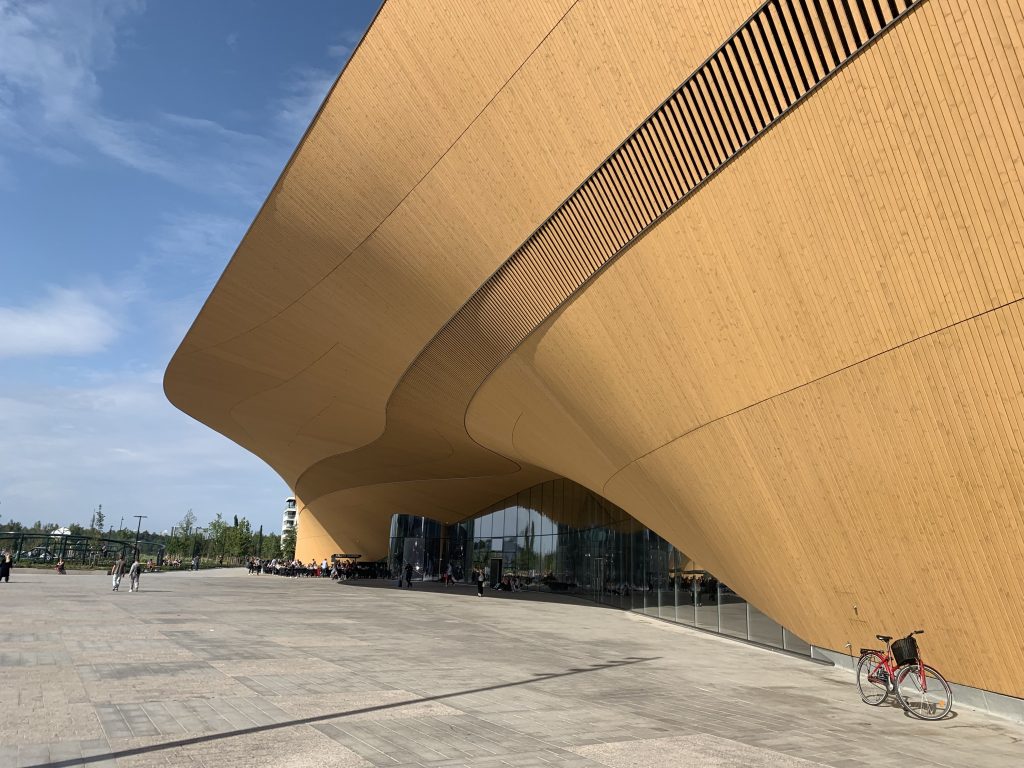
The world’s most beautiful public library– way to go, FInland!
New paper alert: Grey and white matter substrates of action naming
June 18, 2019
A new paper exploring the neural substrate underlying action naming is published. This was an exciting multi-year project conducted together with our collaborators at the Center for Brain and Language at the National Research University HSE in Moscow, Russia. Check it out in Neuropsychologia!
Annual Meeting of the Organization for Human Brain Mapping
June 14, 2019
Dr. Nina Dronkers presented our research “The role of the frontal aslant tract in speech and language processing” at the Annual Meeting of the Organization for Human Brain Mapping in Rome, Italy from June 9th to June 13th.
Clinical Aphasiology Conference
June 3, 2019
Dr. Maria Ivanova gave a platform presentation “Language connections: Exploring the role of different tracts supporting language in aphasia” at the 49th Clinical Aphasiology Conference held in Whitefish, MT from May 28th to June 2nd.
Contact us
510-846-8905
dronkers@berkeley.edu
ivanova@berkeley.edu
